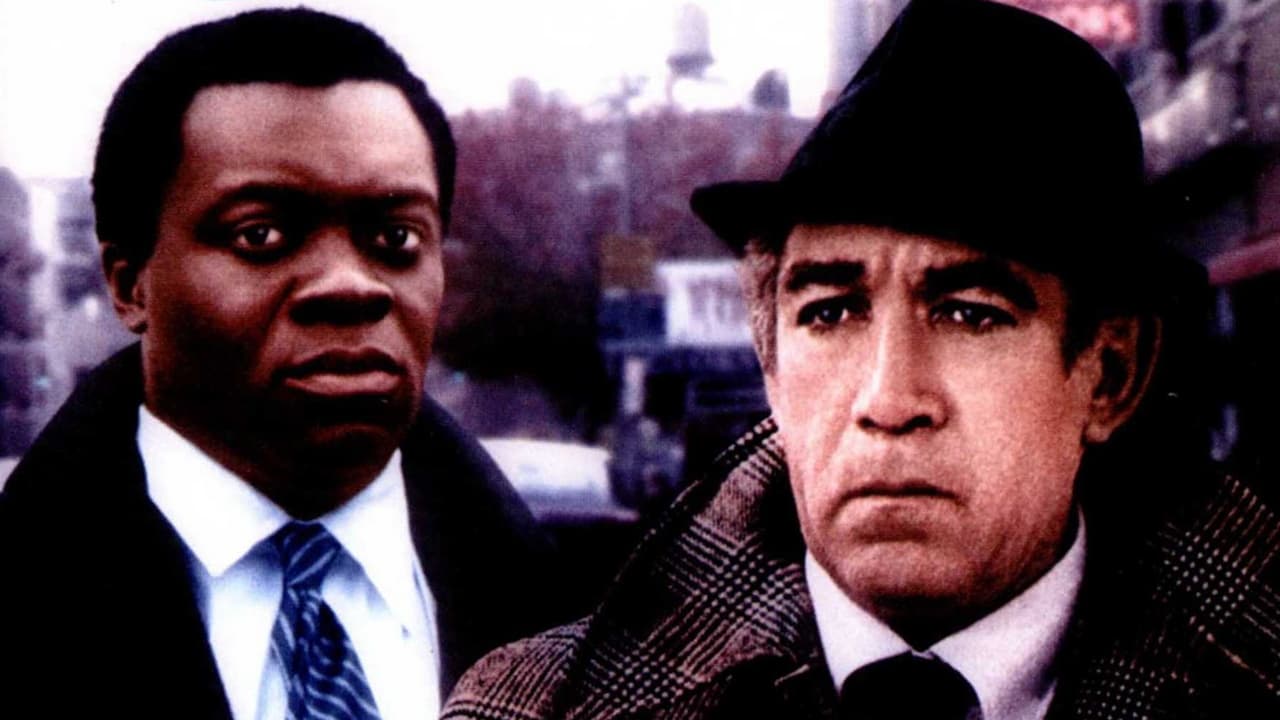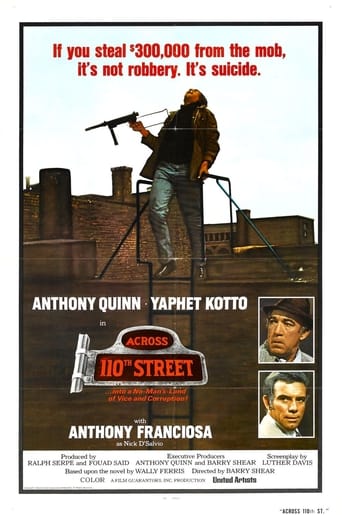

A couple of fine actors here -- Anthony Quinn and Yaphet Koto. Anthony Franciosa is less spastic than usual. And the story itself, in which just about everyone in New York, including the African-Americans in Harlem and most of the police force supposedly arraigned against them, are crooked. Even the less admirable characters are given some humanity: Quinn is about to be sidelined on the NYPD because of his age, and one of the three blacks causing all the uproar and murder has epilepsy. Black against white, with crookedness cutting across the castes like overlapping Venn diagrams. It's pregnant with possibilities.But, alas, it's undone by the direction, editing, and musical score. It's not worth going into in too much detail. The director, Shear, has overwhelmed the plot with crowded scenes and overlapping dialog, or else huge choker close ups of sweaty faces. Some important scenes are deleted. The film is overscored and the music is loud and distasteful. Suspenseful scenes are backed by rattling mariachis.The story itself is good enough to overcome some of these weaknesses but on the whole the impression it makes is one of hasty shooting on the cheap.
... View MoreAnother film inspired by a song, the racier version I didn't so much like, when compared to the one played at the start of QT's Jackie Brown. As for the movie, I did like, where I've seen it now, four to five times. This is an interesting cop drama with an interesting though simple plot, the movie that falls on the verge of a blaxploitation one, a little saggy though in part. Quinn plays a near retiring detective, 55, worn and weary, where he's spent 60 percent of his life in his occupation. His unconventional methods of force, as he says "get's results". After a mob money rip off by three small time ex cons, where a couple of black cops get in the line of fire with some other casualties, being that of the mob boys, he's assigned with a black cop (Yaphet Kotto) who as he says, is "running the show". That he is to Quinn's dislike, where the two form a kind of partnership and mutual friendship. Now we know, stolen money is dead money, and if it's mafia involved, those three thugs lives are dwindling, their fate so foreseeable, the last of three, creating a memorable and honorable death, followed by a shock passing from Quinn's character. We too get into the three black guy's lives, and their conflict with their partners, over their fateful actions, which I liked. Anthony Franciosa (Finder Of Lost Loves, Tenebrae, really is the standout in this and if you push his buttons, the fun is watching in how he responds. Antonio Fargas, an actor I've always liked and enjoyed watching, with his ugly black mug, is fun to here, as he is in other pics, as one of the low life money stealing who meets a short demise. At the other end of this bar, it's always a privilege fine actor Quinn, and here he's top form, giving reality and believiability to this character, even though his unjust methods are kind of reprehensible. This oldie but goodie seventies movie, isn't the best of it's time, but still stacks up pretty well, due to it's story, with some heavy and impactful violence, and it's other asset, Franciosa.
... View MoreI caught this on BBC 1 one night many years ago . I forgot the title but could vividly remember a number of scenes especially a line of dialogue where two characters describe a third one having his genitals mutilated . This type of movie would be broadcast on television 30 years ago and no one would blink an eyelid but at the same time you can understand why it wouldn't be shown on network TV today . It as also a sign of the times back then that the TV broadcast had the F word overdubbed to something less offensive but the racial slurs against both black and whites remained intact . Perhaps the fact this film is consciously insensitive and hard hitting works against it ? This is a pity because it's not some " Blaxploitation " fare but more of a New Hollywood thriller at its best The story itself is no great shakes - a couple of black dudes rip off and kill a few members of the Mafia and the black underworld and also kill a couple of uniformed cops in the process and find if not the entire world against them then at least the law enforcers and law breakers of NYC wanting to cap their ass . It's the sort of film Tarantino has been inspired by but unlike Tarantino's work this movie is devoid of post modernism and crippling self indulgence and is a relatively tightly plotted screenplay where lots of nasty things happen to lots of nasty people . There's a subplot featuring character interaction between Anthony Quinn's nasty racist white cop and Yaphet Kotto's not very nasty by the books black cop that might have been clichéd but does seem fresh and realistic , probably down to the fact the performances and writing portraying a rather amoral relationship between the two men and the wider world . And this does feel like an exceptionally amoral film that we never see nowadays more is the pity
... View MoreWhen some small-time Harlem crooks go up against the Mafia, racist slurs are shot out in addition to the excessive gunfire. The cops get involved, lots of people are killed, and nothing is resolved.This could actually be considered a "Northern" version of "In the Heat of the Night" where an Italian cop (Anthony Quinn) is paired with a black one (Yaphet Kotto) to solve this case where the mafia got an execution style assassination where $300,000 is stolen. The streets of Harlem are not going to be safe for anybody, and there seems to be more people involved in this heist than the ones first shown committing the caper on-screen.While there is some excellent location footage used for some fast-moving chase and fight sequences, the film is badly photographed so a lot of it appears either blurry or dark. A sequence at a club that appears to be involved in a full-on orgy is interrupted by the mobsters where none of the black people standing in the background do anything to keep Antonio Fargas from getting smashed to bits. It isn't the violence or even excessive foul language which makes this a mediocre blaxploitation film; It is the convoluted editing and transition between different characters either on the side of the law or the mafia, with some of the characters (particularly Quinn's) being rather undefined. Quinn's character goes through moments where he seems sympathetic to certain blacks, yet all of a sudden is violently racist. Kotto is definitely playing a character modeled after Sidney Poitier's Mr. Tibbs which makes him likable yet un-original.The scene where Fargas's wife is told of his death is probably one of the few excellent dramatic movies in the film. I give this an extra star above bomb because as a Harlem resident, I can see some areas of reality. Had this had a more personal story and less gruesome gratuitous violence, it would have been alright.
... View More